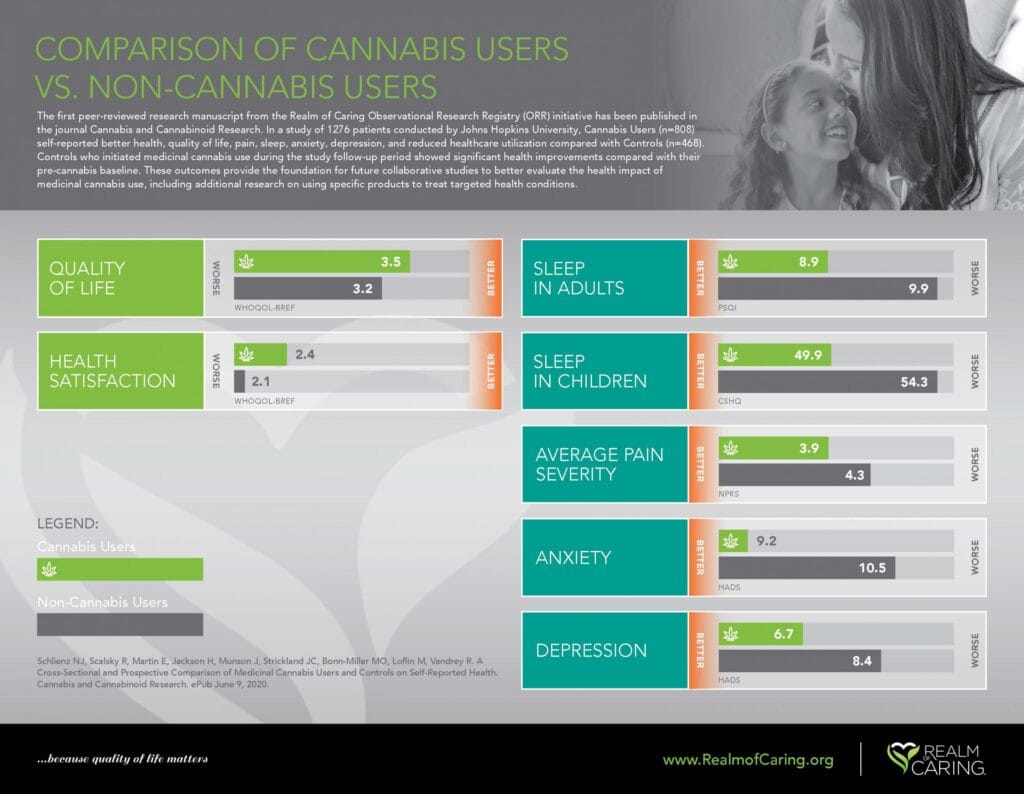A Cross-Sectional and Prospective Comparison of Medicinal Cannabis Users and Controls on Self-Reported Health
Introduction. Despite widespread legalization, the impact of medicinal cannabis use on patient level health and quality of life has not been carefully evaluated. The objective of this study was to characterize self-reported demographics, health characteristics, quality of life, and health care utilization of Cannabis Users compared with Controls.
Methods. A longitudinal, cross-sectional web-based survey study was completed between April 2016 and February 2018. Study participants (N=1276) were a convenience sample of either patients with a diagnosed health condition or caregivers of a patient with a diagnosed health condition registered with the Realm of Caring Foundation (a nonprofit organization dedicated to therapeutic cannabis research and education). Participants were invited via e-mail to complete follow-up assessments every 3 months with 33% of participants completing one or more prospective follow-ups. Assessments included self-reported demographics, healthcare utilization, medication use, pain, anxiety, depression, sleep, and quality of life (QOL). Cannabis Users (N=808) were compared with Controls (N=468) using negative binomial regression and linear mixed effect models testing the effect of initiation, cessation, and maintenance of medicinal cannabis use.
Results. Cannabis Users self-reported significantly better quality of life [t(1,054)=-4.19, p<.001], greater health satisfaction [t(1,045)=-4.14, p<.001], improved sleep [children: t(224 =2.90, p<.01; adults: [t(758)=3.03, p<.01], lower average pain severity [t(1,150)=2.34, p<.05], lower anxiety [t(1,151)=4.38, p<.001] and lower depression [t(1,210)=5.77, p<.001] compared with Controls. Cannabis Users reported using fewer prescription medications [RR=0.86; 95% CI, 0.77 to 0.96] and were less likely to have a past month emergency department (ED) visit [RR=0.61; 95% CI, 0.44 to 0.84] or hospital admission [RR=0.54; 95% CI, 0.34 to 0.87]. Controls who initiated cannabis use after baseline showed significant health improvements at follow-up, and the magnitude of improvement mirrored the between-groups differences observed at baseline.
Conclusions. Cannabis use was associated with improved health and quality of life. Longitudinal testing suggests that group differences may be due to the medicinal use of cannabis. Although bias related to preexisting beliefs regarding the health benefits of cannabis in this sample should be considered, these findings indicate that clinical trials evaluating the efficacy of defined cannabinoid products for specific health conditions are warranted.

This library aims to empower you with knowledge but it does not replace the personalized advice and guidance a healthcare professional can provide. Before implementing any changes to your health regimen based on the contents of this library, we strongly advise you to consult with a qualified healthcare professional. Your doctor’s expertise is essential for interpreting how these insights may apply to your unique health circumstances.

